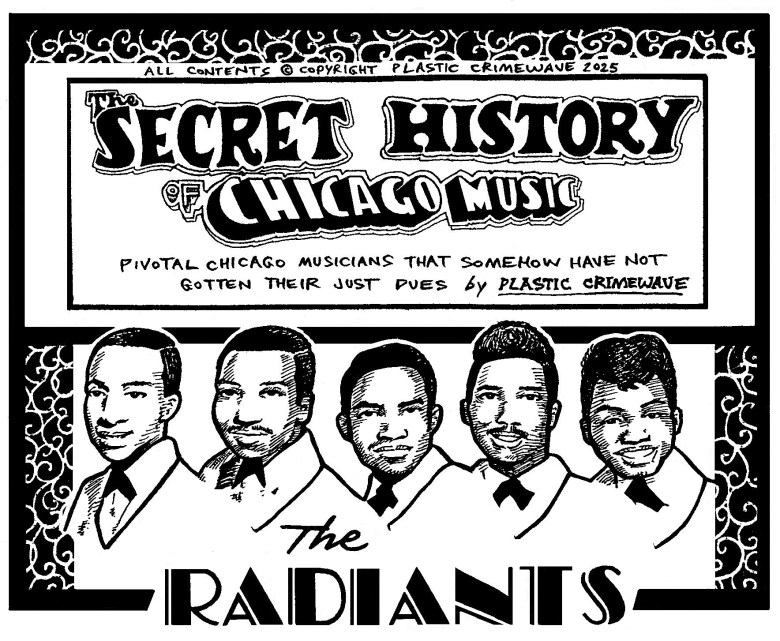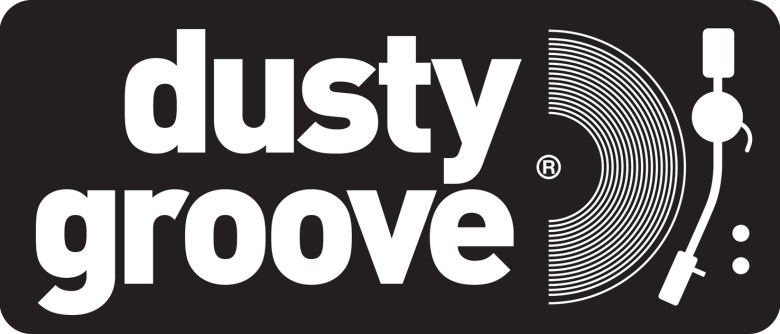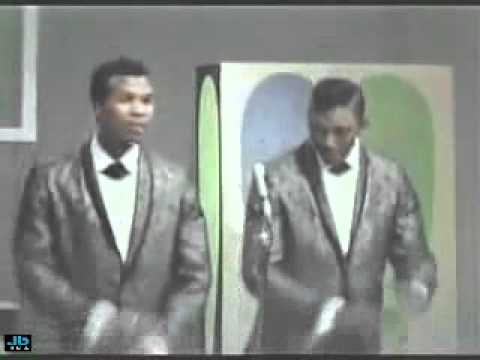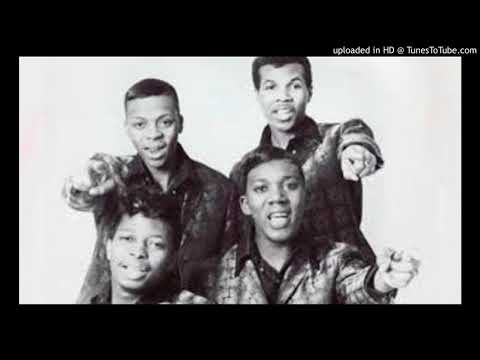
Since 2005 Plastic Crimewave (aka Steve Krakow) has used the Secret History of Chicago Music to shine a light on worthy artists with Chicago ties who’ve been forgotten, underrated, or never noticed in the first place.
Chicago’s famed soul-music scene produced beloved groups (the Impressions, the Chi-Lites) and legendary labels (Chess, Vee-Jay), and that’s reason enough to remember soul’s roots in doo-wop. Doo-wop hasn’t aged as well as soul—it hasn’t produced an answer to neosoul, for instance—but it was one of the genres that fed into rock ’n’ roll. In the 50s and early 60s, it was extremely popular, and groups of young singers (who usually got started in church) developed their doo-wop chops harmonizing on street corners, in parks, or anywhere they could. The Radiants belong to this history, and their development also parallels the early-60s shift from gospel and doo-wop to soul and R&B.
The Radiants formed around lead singer and tenor Maurice McAlister, who was born on April 23, 1934, and raised in Chicago. In 1960, while a congregant at the Greater Harvest Missionary Baptist Church (established in 1912 and still open at 5141 S. State), McAlister put together a vocal group by cherry-picking the best belters from the church’s youth choir—baritone Wallace Sampson, bass Elzie Butler, and tenors Jerome Brooks and Charles Washington. Within a few months, Washington was replaced by McLauren Green (sometimes given as Green McLauren or Green McLaurin).
At first they sang mostly gospel, but the young group was also developing secular material, written by McAlister. Within a year the Radiants had a demo recording and began seeking a label. “We had been trying, walking up and down Michigan Avenue, which was Record Row then,” McAlister told Robert Pruter for his book Chicago Soul. “We went to Chess four or five times, but they never did have the time for us.”
Luckily, the Radiants’ manager, Lee Jackson, knew label boss Leonard Chess. Jackson had a day job as a supervisor for a meatpacking company, and in true Chicago fashion, he ingratiated himself using gifts of encased meats. “He used to go to Chess Records and talk to Leonard,” said Brooks. “A lot of time he’d bring him a thing of bologna or salami, so they got pretty tight.” Jackson also gave Chess the Radiants demo, and by May 1962 they were recording for the label.
Their first session culminated in the August release of their debut single, “Father Knows Best” b/w “One Day I’ll Show You (I Really Love You),” which became a minor local hit. The single balances perfectly on the cusp between doo-wop and soul: The A-side combines a Motown-style backbeat with the innocent-sounding harmonies of the 50s, while the B-side rests on the deep bass vocal of doo-wop but adds a passionate Sam Cooke–style lead from McAlister and strings reminiscent of Johnny Pate’s orchestrations for the Impressions.
In 1963, the Radiants released two more fab singles, “Heartbreak Society” b/w “Please Don’t Leave Me” in February and “I’m In Love” b/w “Shy Guy” in October. The latter featured new member Frank McCollum (Green left for the army late that year), and “Shy Guy” and “Please” both have a rollicking rock ’n’ roll drive and arrangements heavy on reverbed guitar. The other two tracks stick to the tempos and vocal blends of 50s doo-wop groups such as the Flamingos.
The Radiants all but broke up in 1964, with only McAlister and Sampson remaining. They continued as a trio by recruiting another member of the Greater Harvest choir, organist-vocalist Leonard Caston Jr., who’d just left the army. The new lineup’s first release, “Voice Your Choice” b/w “If I Only Had You,” came out in late 1964 and proved to be the Radiants’ biggest hit, reaching number 51 on the Billboard pop chart and number 16 on the R&B chart.
From their first days with Chess, the Radiants had been working with A&R man, producer, and songwriter Roquel “Billy” Davis, who’d joined the label in 1961 and helped position it to ride the growing wave of soul. Pruter described the records he produced as “fully orchestrated and arranged, often horn driven and deeply touched with gospel and blues fervor.” McAlister and Caston eventually joined Davis’s staff of songwriters and producers, and by 1964 McAlister had contributed tunes to Chess artists such as Bo Diddley and Sugar Pie DeSanto.
McAlister wrote “Voice Your Choice” with Gerald Sims (who’d later play guitar on R&B classics “Rescue Me” and “Higher and Higher”), and its intricate three-part harmonies echoed the Impressions. Later in 1964, the Radiants released “I Gotta Dance to Keep My Baby” b/w “Noble the Bargain Man,” with an A-side cowritten by David Clowney (aka Dave “Baby” Cortez of “The Happy Organ” fame).
In 1965, the slow-grooving A-side of “It Ain’t No Big Thing” b/w “I Got a Girl” reached number 14 on the R&B chart, with McAlister and Caston trading off pleading shouts. “The marvelous vocal interplay of the song worked like a constant flux of voices slipping in and out of the musical mix,” Pruter noted, “a technique later copied by the progressive r&b groups of the 70s, Sly and the Family Stone, and Earth, Wind and Fire.” Pruter also comments that future Earth, Wind & Fire mastermind Maurice White drummed on all the Radiants’ sessions.
Later in 1965, Caston left to focus on writing and producing for Chess. He also played piano on sessions alongside saxophonist Gene Barge. James Jameson replaced Caston for the underrated 1966 platter “Baby You’ve Got It” b/w “I Want to Thank You, Baby.” The chugging Motown-style groove on “Baby You’ve Got It” was a departure for the Radiants, and though it wasn’t a big hit in the States, it did better overseas—UK mod-soul unit the Action covered it that same year.
After that single, McAlister too stepped away from the Radiants to get more involved in production and songwriting. The Radiants didn’t disappear, though, because Davis brought in a new lead singer from another group: Mitchell Bullock had lent his powerful gospel pipes to the Confessions, who’d recorded the lush, soulful single “(Don’t It Make You) Feel Kinda Bad” for Chess in 1965 but broke up before it could be released. In a classic case of record-label high jinks, Davis had Chess put it out under the Radiants name in 1967, and it sold well locally.
The Radiants were now Bullock, Sampson, Jameson, and Caston’s younger brother Victor. Caston cowrote both songs on the group’s first 45 in this incarnation, “Don’t Take Your Love” b/w “The Clown Is Clever,” which adorned their polished, gritty R&B with brilliant Charles Stepney arrangements. In 1968, the Radiants had their last chart hit, also cowritten by Caston and graced with the golden Stepney touch. “Hold On” b/w “I’m Glad I’m the Loser,” with its late-60s fuzz guitar and unstoppable backbeat, stayed on the R&B charts for seven weeks.
That year the Radiants would drop another single written and produced by the same team, “I’m Just a Man” b/w “Tears of a Clown” (not that one). It tanked, sadly, and so did the group’s two 1969 records: “Book of Love” b/w “Another Mule Is Kicking in Your Stall” (with a funky A-side and a Temptations-meets-Sly B-side) and “Choo Choo” b/w “Ida Mae Foster.”
The Chess brothers sold the label in 1969, and Leonard Chess died in October of that year, so it’s probably irrelevant whether the Radiants left or were dropped. The group cut their final tracks in 1971 for Twinight Records, with soul man Syl Johnson as producer. “My Sunshine Girl” b/w “Don’t Wanna Face the Truth” had the trademark Radiants harmonies in full glorious effect, and the B-side had the kind of up-tempo groove that UK fans on the Northern Soul scene love. It did no business, though, and the Radiants called it a day in 1972.
During the Radiants’ last few years, former members McAlister and Green had operated as the duo Maurice & Mac. They tended toward a rawer soul sound, and the singles they released between 1967 and 1972 included the poppin’ “So Much Love” and the simmering “You Left the Water Running.”
I can’t find any evidence that McAlister stayed active in the music biz after 1972, and he died from cancer on November 11, 2017. The Radiants’ music has been reissued, but the only two compilations I know about probably aren’t too findable these days. Discogs thinks the 1995 Titanic Records release The Radiants: The Ultimate Collection might be a bootleg, and the 1999 comp The Radiants With Maurice & Mac: The Singles Collection 1962-1970 is apparently the only thing Rack O Ribs Records ever put out. It does include a rare McAlister solo single, though, the catchy “Baby Hang On” b/w “I’d Rather Do It Myself” from 1967.
I’d love it if such seminal music would stay in print, and I’d snap up a new double-LP collection if I could be sure it was legitimate. In the meantime, keep an eye out for original copies of the Radiants’ singles—they’re still out there, and they might even stay affordable if the record-collecting public doesn’t figure out how great they are!
The radio version of the Secret History of Chicago Music airs on Outside the Loop on WGN Radio 720 AM, Saturdays at 5 AM with host Mike Stephen. Past shows are archived here.

The Secret History of Chicago Music is sponsored by Dusty Groove Records. Find rare, new, and used LPs and CDs at dustygroove.com or in-store 9 AM–7 PM, 1120 N. Ashland.






